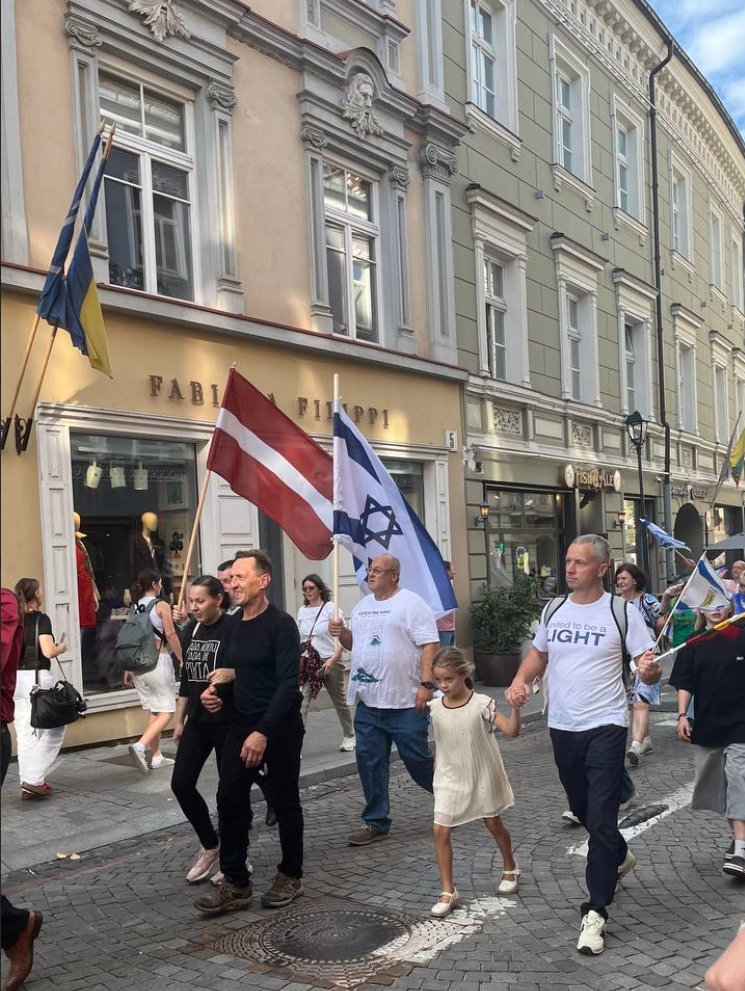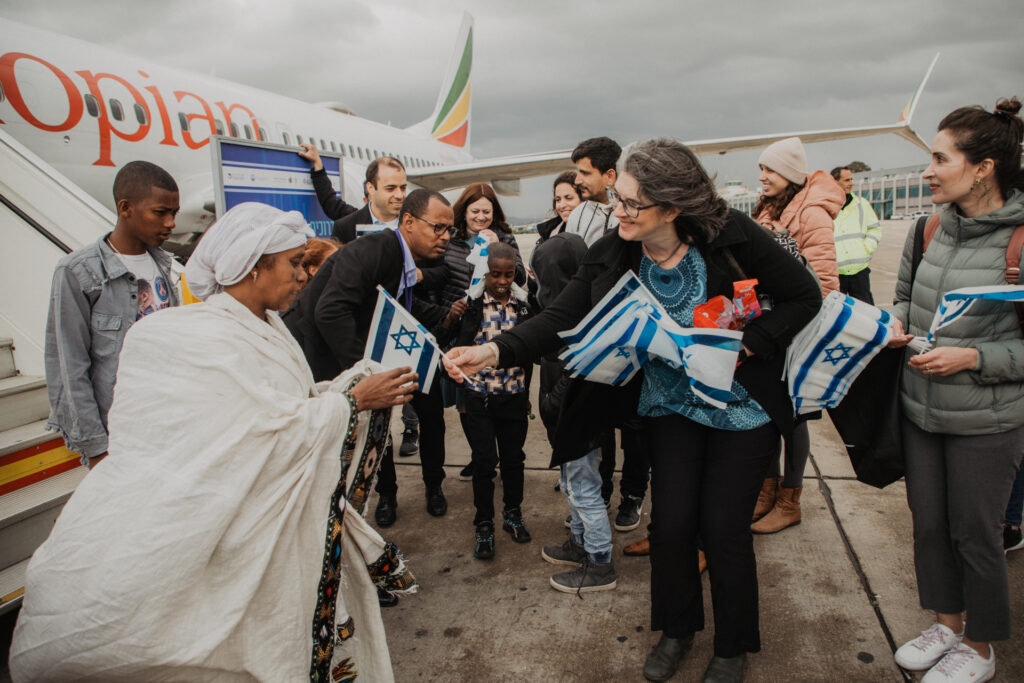
Aliyah, Antisemitism, and Gentiles in God’s End-Time Plan
By Howard Flower, ICEJ Aliyah Director
What does the return of the Jewish people have to do with God’s end-time plan—and do gentiles have a role to play in it?
God’s End-Time Plan
In the quiet, hushed moments before a plane carrying new immigrants touches down at Ben Gurion Airport, you can feel the weight of history shifting. The doors open, and the passengers—families from France, singles from North America, Beta Israel from Ethiopia—step onto the tarmac. Many kneel to kiss the ground. Some weep. All are home.
This is Aliyah, the return of the Jewish people to the land of Israel. And in our time, God’s ancient, prophetic end-time promise is being fulfilled before our eyes, driven by a force as old as the exile itself: a terrifying resurgence of antisemitism.

For the gentile and Jewish believer watching the news with a heavy heart, the headlines can feel overwhelming. Synagogues defaced. Jewish students harassed on university campuses. Deadly attacks in supermarkets and prayer halls. The ancient hatred has put on modern clothes, emerging from the far-right, the far-left, and radical Islamism with a viciousness many thought was consigned to history books. Though it is easy to give in to despair, but we must not. We are called to see with prophetic eyes. What the enemy intends for evil, God is using for good (Genesis 50:20). This wave of hatred is, tragically and sovereignly, becoming a primary catalyst for the greatest ingathering of the Jewish people in modern history.
The Unmistakable Connection: From Persecution to Promise
The link between antisemitism and Aliyah is not a coincidence; it is a principle woven into the fabric of Zionism and Scripture. The State of Israel was founded as a refuge, a direct response to the centuries of persecution that culminated in the Holocaust. Its very raison d’être is etched with the memory of pogroms, inquisitions, and gas chambers. Israel’s Law of Return—which grants every Jew the right to citizenship—is a legal testament to a solemn vow: “Never again will our people be homeless in the face of hatred.”
Aliyah from Western Europe
The period from 2015 to 2018 provided a stark, modern case study. After a series of brutal Islamist attacks in France, including the siege of a kosher supermarket where Jews were explicitly targeted for being Jewish, Aliyah from Western Europe surged to record levels. These were not primarily religious zealots; they were secular, middle-class professionals who loved their home countries. But the constant pressure of fear—the verbal abuse, the cemetery desecrations, the need for armed guards at schools and synagogues—became an unbearable weight. They were not just leaving France; they were fleeing to Israel. They were choosing life.
Today, we see this pattern accelerating globally. The illusion of safe assimilation has been shattered. A Jewish person can no longer assume safety in London, Paris, or New York. This collapse of security is a powerful “push factor” forcing a generation to ask: What will life here be like for my children? And in asking that question, they turn their eyes toward Zion.
The Divine Blueprint: First the Physical, Then the Spiritual
As believers, we must interpret these events through the lens of God’s Word, not merely through the panic of the 24-hour news cycle. The prophets provide a clear, two-stage blueprint for Israel’s restoration, and what we are witnessing is the breathtaking fulfillment of the first stage.

Prophecies about Aliyah in Ezekiel
The Scriptures are unequivocal: God promises to first bring His people back to the Land physically, regardless of their spiritual state. He declares through Ezekiel: “For I will take you from the nations, gather you from all the lands, and bring you into your own land” (36:24 NASB). Only after this physical restoration does God promise the spiritual renewal: “Then I will sprinkle clean water on you, and you will be clean . . . I will give you a new heart and put a new spirit within you” (Ezekiel 36:25–26 NASB).
God accomplishes this physical return using both the gentle call and the stern push. He speaks of sending “fishermen” to draw them with the promise of Zion (Jeremiah 16:16). But He also sends “hunters”—a metaphor for the persecutors and pressures that hunt them from every mountain and hill, compelling them toward their only safe haven.
The current global resurgence of antisemitism is a form of these “hunters.” It is a severe mercy. While God does not author the evil—He is grieved by it—in His sovereignty, He uses the wrath of man to praise Him (Psalm 76:10) and to accomplish His covenantal purposes. He is leveraging the darkest impulses of humanity to gather His children to the one place He has ordained for their ultimate protection and, one day, their spiritual redemption.
This is why we must not see Aliyah as a purely political or humanitarian phenomenon. We are witnessing the pages of prophecy turning. Every flight from Kyiv, every family arriving from Paris, is a living testament to the faithfulness of a God who keeps His promises.
Our Call to Action: How to Align with God’s Plan
This is not a time for passive observation. We are called to be active participants in this divine drama. The biblical model for how gentiles should assist in this return is powerfully demonstrated in the story of Cyrus the Great (Isaiah 45:1). This pagan king, an unbeliever, was called God’s “anointed” because he was stirred by God to issue the decree that freed the Jews from Babylonian captivity and funded their return to Jerusalem to rebuild the temple (Ezra 1:1–4).
Today, God is still stirring the hearts of gentiles—especially believers—to fulfill this Cyrus-like role.
How we can align ourselves with God’s end-time plan:
-
-
- Speak Out with Courage
In a world where antisemitism is often disguised as political criticism, silence is complicity. We must be unequivocal in our condemnation of hatred against the Jewish people, whether it comes from the right, the left, or from religious extremism. Our voices must be a clear sound of solidarity, telling our Jewish friends and neighbors, “You are not alone.” - Provide Practical Support
The journey of Aliyah is costly. The work of welcoming and absorbing hundreds of thousands of immigrants is a monumental task for the nation of Israel. We can be the modern-day vessels of Cyrus by supporting the organizations on the front lines. By giving to ministries that fund flights, provide housing, and offer Hebrew classes, we are not just donating to a charity; we are funding prophecy. We are paying for the tickets that bring God’s people home. - Advocate and Defend
We must support Israel’s right to exist as a Jewish state and its fundamental right to defend itself. A safe and secure Israel is the necessary destination for this Aliyah. This means engaging in the political process, educating our communities, and rejecting the lies of delegitimization that seek to undermine Israel’s very right to exist. - Pray with Purpose
Prayer is the engine of this work. We are to “pray for the peace of Jerusalem” (Psalm 122:6). Pray for the protection of Jewish communities worldwide. Pray for the peace and safety of Israel. Pray that God would stir the hearts of His people to come home. Pray for the resources and the open doors needed for this great exodus. And pray for the spiritual awakening that will follow the physical return—that the eyes of the Jewish people would be opened to recognize their Messiah.
- Speak Out with Courage
-

A Final Word of Encouragement
To the Jewish believer feeling the weight of this hour: be encouraged. The God of Abraham, Isaac, and Jacob is on the move—the fear you feel is not a sign of weakness but a prompting of the Spirit. It is the “nudge” toward the destiny God has for you and your family in your ancestral homeland. Do not see your potential Aliyah as a flight from fear but as a courageous step into the future God has promised you—a future of hope, safety, and purpose.
To the gentile believer: we have been given the extraordinary privilege of living in a time of prophetic fulfillment. We are not mere spectators. We are called to be modern Cyruses—stirred by God to facilitate the return. Let us not be found sleeping. Let us be a generation that stands in the gap, speaks up, gives generously, and prays fervently for the restoration of Israel.
Conclusion
Though the cloud of antisemitism is dark, it contains a silver lining of glory. It is driving the Jewish people home. And in helping them, we are not just aiding refugees; we are aligning ourselves with the unstoppable, end-time plan of the God of Israel.
We are participating in the great story of redemption, and there is no greater privilege.
Related Articles
Antisemitism, the Church, and Anti-Israel Sentiment
Antisemitism in Christianity Today
Keep Learning
What Is Replacement Theology?
Biblical Geography: Why Christians Should Study It



